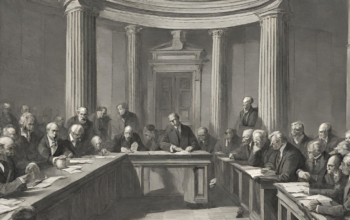Literasi Hukum – This article explains the use of interpretation in criminal law and some principles that are often used in criminal law analogies in Indonesia.
General Principles and Principles of Interpretation in Criminal Law
In legal discovery activities, one method that is often used is legal interpretation and analogy. There are several general principles regarding interpretation in criminal law. They are:
- The principle of proportionality means that a law must balance the means and the purpose.
- The Principle of Subsidiarity states that if several alternative solutions are difficult to propose, the solution that causes the least harm must be chosen.
- The Principle of Relevance means that the applicability of criminal law only questions deviations in social behavior that deserve reaction or correction from the point of view of criminal law.
- The Principle of Decency (Maarten Luther), states that decency must test juridical logic.
- The principle of in dubio pro reo, means that if there is doubt, the provision or explanation that is most favorable to the defendant must be chosen.
- The principle of exceptio format regulam, meaning that if a deviation from the general rule is made, then the deviation must be interpreted narrowly.
- The principle of titulus est lex and rubrica est lex, the first principle mentioned means that the title of the legislation is decisive while the second principle means that the rubric or part of the legislation is decisive.
- Material principle, which concerns unwritten rules that refer or refer to an important social ethical value, a certain legal ideal or ideal.
Methods of Legal Interpretation
Basically, interpretation is something that cannot be avoided. This was stated by Van Bammelen and Van Hattum. Broadly speaking, there are four commonly used methods of interpretation, namely:
Grammatical Interpretation, which means that the meaning of the provisions of the law is interpreted by describing it according to everyday language.
Systematic Interpretation, which interprets the provisions of the law by connecting them with other legal regulations or with the entire legal system.
Historical Interpretation, namely the interpretation of the meaning of the law according to the occurrence by examining the history of the occurrence of the legislation.
Telelogical / Sociological Interpretation, namely interpreting the meaning of the law in accordance with the purpose of the legislator rather than the sound of the words of the law.
According to Sudikno Mertokusumo, interpretation can be divided into restrictive interpretation and extensive interpretation.
Restrictive interpretation is explaining a statutory provision by limiting its scope, namely narrowing the meaning of a regulation by starting from its meaning according to language (grammatical interpretation, systematic interpretation). Meanwhile, extensive interpretation is to go beyond the meaning of something according to grammatical interpretation (historical interpretation, telelogical interpretation).
Another opinion also expressed by Jan Remmelink added several interpretations in criminal law.
First, creative interpretation, this interpretation is not extensive but rather restrictive. The judge with this interpretation reveals a certain element that he considers to be contained in the criminal formulation, even though the element is not expressly described in it.
Second, traditional interpretation, which is finding the law by looking at a behavior in the legal tradition.
Third, harmoniserende interpretatie, which is used to avoid disharmony or conflict between one legislation and other legislation.
Fourth, doctrinal interpretation, which strengthens the argument by referring to a particular doctrine.
Reference
- Eddy.O.S. Hiariej, Prinsip-Prinsip Hukum Pidana, Cahaya Atma Pustaka, Yogyakarta, 2016.
- Sudikno Mertokusumo, Penemuan Hukum, Sebuah Pengantar, Liberty, Yogyakarta, 2001.








